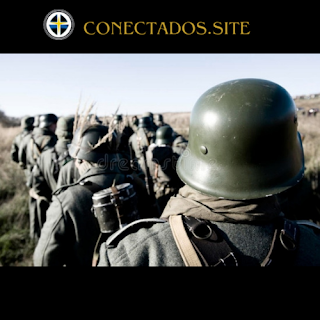O pacto entre a União Soviética e a Alemanha Nazista
Durante a Segunda Guerra Mundial, a Alemanha e a União Soviética formaram uma aliança surpreendente, no entanto, é importante lembrar que o nazismo (Nacional-Socialismo) também era uma forma de socialismo, e havia muitos pontos em comum entre as duas ideologias, ambas tinham sistemas de planejamento centralizados, controle estatal da economia e a ideia de um Estado forte e intervencionista, e também compartilhavam do ódio à democracia liberal e ao capitalismo.
Ambos os países viram vantagens na cooperação mútua. A Alemanha estava buscando expandir seu domínio sobre a Europa, enquanto a União Soviética buscava proteger seus interesses no leste da Europa.
Juntos, eles planejaram conquistar a Polônia em setembro de 1939.
A Alemanha, com seu poderio militar e tecnológico, avançou pela Polônia a partir do oeste, enquanto a União Soviética, com seu exército gigantesco, invadiu a partir do leste. A Polônia, superada em número e armamento, caiu rapidamente sob o controle das duas potências. A aliança parecia forte e promissora.
Porém essa aliança era instável desde o início. Embora o partido Nazista fosse nacional socialista e compartilhasse ideias semelhantes ao comunismo, os dois países trabalharam juntos em nome de seus próprios interesses.
À medida que a guerra continuava, a relação entre a Alemanha e a União Soviética se deteriorava. A Alemanha queria expandir ainda mais seu domínio na Europa, enquanto a União Soviética buscava proteger sua própria esfera de influência. Quando os alemães começaram a se mover em direção ao leste, a União Soviética percebeu que a aliança não era mais benéfica para seus interesses.
O fim da aliança entre a Alemanha e a União Soviética marcou uma mudança significativa na guerra, e refletiu a natureza instável das relações internacionais durante a Segunda Guerra Mundial. Foi uma lembrança de que as alianças podem ser temporárias e que os interesses nacionais têm precedência.
José Rodolfo G. H. Almeida é escritor e editor do site www.conectados.site
Apoie o Site
Se encontrou valor neste artigo, considere apoiar o site. Optamos por não exibir anúncios para preservar sua experiência de leitura. Agradecemos sinceramente por fazer parte do suporte independente que torna isso possível!
___________________________________
The Pact between the Soviet Union and Nazi Germany
During World War II, Germany and the Soviet Union formed a surprising alliance. However, it is important to remember that Nazism (National Socialism) was also a form of socialism, and there were many similarities between the two ideologies, including hatred of liberal democracy and capitalism, centralized planning systems, state control of the economy, and the idea of a strong and interventionist state. Both countries saw advantages in mutual cooperation. Germany was seeking to expand its dominance over Europe, while the Soviet Union was seeking to protect its interests in Eastern Europe. Together, they planned to conquer Poland in September 1939. Germany, with its military and technological power, advanced into Poland from the west, while the Soviet Union, with its massive army, invaded from the east. Poland, outnumbered and outgunned, quickly fell under the control of the two powers. The alliance seemed strong and promising. However, this alliance was unstable from the start. Although the Nazi Party was national socialist and shared similar ideas with communism, the two countries worked together for their own interests. As the war continued, the relationship between Germany and the Soviet Union deteriorated. Germany wanted to expand its dominance in Europe even further, while the Soviet Union sought to protect its own sphere of influence. When the Germans began to move eastward, the Soviet Union realized that the alliance was no longer beneficial to its interests. The end of the alliance between Germany and the Soviet Union marked a significant change in the war, and reflected the unstable nature of international relations during World War II. It was a reminder that alliances can be temporary and that national interests take precedence.
José Rodolfo G. H. Almeida is a writer and editor of the website www.conectados.site
Support the website
If you found value in this article, please consider supporting the site. We have chosen not to display ads to preserve your reading experience. We sincerely thank you for being part of the independent support that makes this possible!

